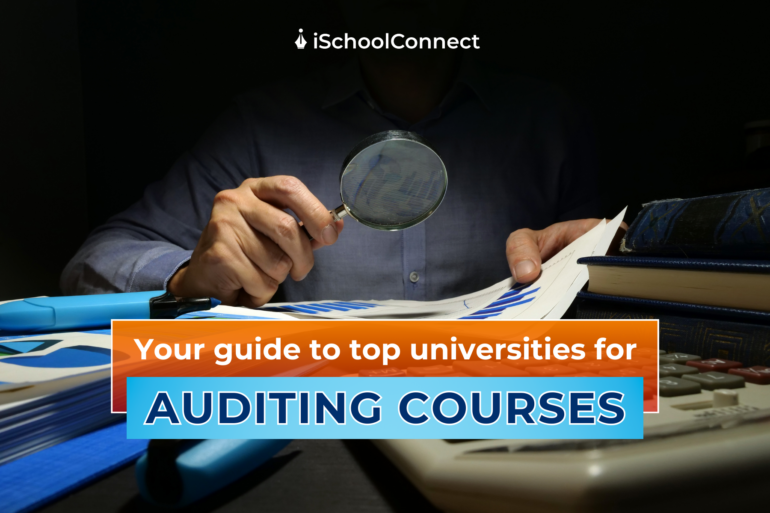Table of Contents
- Auditing certifications for career advancement
- Eligibility criteria for Auditing courses
- Popular Auditing courses
- Top universities to study auditing abroad
- Harvard University (USA)
- London School of Economics and Political Science (UK)
- University of Melbourne (Australia)
- University of Toronto (Canada)
- National University of Singapore (Singapore)
- INSEAD (France)
- University of Zurich (Switzerland)
- Tsinghua University (China)
- University of Cape Town (South Africa)
- Technische Universität München (Germany)
- Careers and salary range
- Key takeaways
- FAQs
Auditing certifications for career advancement
Controlling, confirming, and certifying an organization’s resources, financial reports, and transactions is the responsibility of auditors. This helps the business draw in investors, apply for fresh loans, and file taxes accurately. Throughout their careers, these accounting experts typically obtain a variety of degrees and accreditations from universities to stay current and effectively carry out their tasks. Finding out more about the many certifications available in this profession could be helpful in assessing your career advancement prospects and determining which accreditations would be most appropriate for you. Let’s further discuss Auditing courses in this blog.
Eligibility criteria for Auditing courses
Pursuing Auditing courses requires a comprehensive understanding of the eligibility criteria. Typically, universities offering auditing programs require candidates to have completed their undergraduate studies in accounting, finance, or a related field.
A bachelor’s degree is often a prerequisite, and some institutions may specify a minimum GPA for admission.
Prospective students might need to submit letters of recommendation, a statement of purpose, and, in certain cases, relevant work experience.
Familiarizing oneself with these criteria is crucial to ensuring a smooth application process.
Popular Auditing courses
A variety of subjects are covered in auditing courses in order to give students the information and abilities they need to have a successful career in auditing. Some of the popular courses include-
- Auditing and Assurance Services- It is a foundational course that deals with the principles and practices of auditing, emphasizing the importance of assurance in financial reporting.
- Forensic Accounting and Fraud Examination- Focused on detecting and preventing fraud, this course delves into investigative techniques and forensic accounting methods.
- Internal Audit and Control- Examines the role of internal auditors in assessing and improving organizational processes, risk management, and control systems.
- Ethics in Auditing- Explores the ethical considerations and challenges faced by auditors, emphasizing the importance of integrity in the auditing profession.
Top universities to study auditing abroad

Choosing the right university is crucial to a student’s academic and professional success. Here is a curated list of the top 10 global universities renowned for their auditing programs-
Harvard University (USA)
Renowned for its business school, Harvard offers a comprehensive auditing curriculum that combines theory and practical application. Harvard University in the United States offers an exceptional Auditing course that stands as a hallmark of academic excellence. It fosters critical thinking and professional development among students with a comprehensive understanding of auditing principles and practices. The curriculum equips individuals with the skills necessary to navigate the complexities of financial scrutiny, risk assessment, and regulatory compliance.
London School of Economics and Political Science (UK)
Celebrated for its rigorous auditing programs, the LSE provides students with a global perspective on financial practices. The Auditing course at LSE in the United Kingdom is a distinguished program that combines academic rigor with a contemporary understanding of the global financial landscape. The course is famous for its excellence in economics and political science. It is a testament to the institution’s reputation for producing leaders and innovators.
University of Melbourne (Australia)
With a strong emphasis on research and practical skills, the University of Melbourne’s Auditing courses are highly regarded in the Asia-Pacific region. Led by a distinguished faculty with a wealth of industry experience, the curriculum combines theoretical knowledge with practical applications. It ensures students develop a nuanced perspective on financial scrutiny, risk management, and regulatory compliance. The University of Melbourne incorporates case studies and interactive learning opportunities. It shows the university’s commitment to fostering critical thinking and analytical skills.
University of Toronto (Canada)
Known for its diverse and inclusive learning environment, the University of Toronto offers Auditing courses that align with international standards. The program curriculum seamlessly integrates theoretical concepts with real-world applications. It ensures students acquire the skills and knowledge needed for success in the field of auditing. Graduates of the Auditing course at the University of Toronto emerge as well-rounded professionals, ready to contribute to the financial governance and assurance landscape.
National University of Singapore (Singapore)
A hub for academic excellence in Asia, NUS provides auditing students with a solid foundation in financial reporting and analysis. The curriculum bridges theory and practice, ensuring students gain practical insights into the dynamic world of auditing. With a distinguished faculty consisting of experts in the field, the course emphasizes critical thinking, analytical skills, and ethical considerations. It prepares students to navigate the intricacies of financial scrutiny.
INSEAD (France)

Renowned for its MBA program, INSEAD offers specialized Auditing courses that cater to the needs of professionals seeking a global perspective. The curriculum is carefully crafted to integrate theoretical foundations with real-world applications. It ensures that students are well-prepared for the complexities of contemporary auditing practices. With an esteemed faculty drawn from diverse backgrounds and industries, the course fosters a holistic approach to financial oversight.
University of Zurich (Switzerland)
With a focus on financial and managerial accounting, the University of Zurich’s Auditing courses are designed to prepare students for the challenges of the global business landscape. The program’s curriculum blends theory with practical applications, ensuring students develop a comprehensive skill set to understand the intricacies of finance. The program’s combination of academic rigor and Swiss financial expertise makes it an excellent choice for those seeking a thorough education in auditing.
Tsinghua University (China)
As a leading institution in Asia, Tsinghua University offers auditing programs that blend traditional auditing practices with advanced technologies. Tsinghua’s strategic location in Beijing, a major financial and technological hub, exposes students to diverse industries and valuable networking opportunities. The program combines academic excellence and focuses on China’s economic dynamics. It is an exceptional choice for those seeking to learn about the complexities of auditing in a global context.
University of Cape Town (South Africa)
Noted for its commitment to excellence, the University of Cape Town provides auditing students with a holistic understanding of financial reporting and auditing standards. The curriculum provides the skills needed to navigate the unique challenges of auditing in the South African and broader global context. Graduates of the Auditing course at this university emerge as professionals well-prepared to contribute to the advancement of financial governance.
Technische Universität München (Germany)
With a strong emphasis on research and innovation, TUM offers Auditing courses that integrate technological advancements into the auditing profession. Germany’s status as a key player in the European economy further enriches the learning experience, exposing students to a highly regulated financial environment. The Auditing course fosters innovation and equips graduates with the multifaceted skills needed to redefine the future of auditing practices.
Careers and salary range
Pursuing Auditing courses opens doors to many career opportunities across various industries. Graduates can explore roles such as external auditor, internal auditor, forensic accountant, compliance officer, and risk analyst. The demand for skilled auditors is consistent, given the increasing complexity of financial regulations and the emphasis on corporate governance.
The salary range for auditors varies based on factors such as education, experience, industry, and geographic location. Entry-level positions may start with a competitive salary, and as professionals gain experience and expertise, they can progress to higher-paying roles. Certification, such as Certified Public Accountant (CPA) or Certified Internal Auditor (CIA), can significantly enhance career prospects and earning potential.
Key takeaways
- The increasing demand for ethical and skilled auditors underscores the critical role they play in ensuring transparency and accountability in organizations.
- Exploring the diverse certifications available in auditing is crucial for career advancement prospects. Choosing the proper accreditation enhances credibility and opens doors to new opportunities.
- Choosing the right university is paramount, and the top 10 global universities are famous for their auditing programs.
If you are eager to explore international courses and certifications further, we’re here to assist you on your journey to professional excellence. Contact us for more information and personalized guidance tailored to your career goals.
Liked this blog? Read next: Top 8 food technology courses worldwide
FAQs
Q1. Can international students apply to Auditing courses, and what support is available for them?
Ans- International students are welcome to apply. Many of these universities provide dedicated support services for international students, including language assistance, cultural integration programs, and guidance on visa-related matters.
Q2. Can students from non-accounting backgrounds transition into auditing through these programs?
Ans- While a background in accounting or finance is often preferred, some universities may offer bridge programs or additional courses to help students from non-accounting backgrounds transition into auditing programs. It’s recommended to check with each university for specific admission requirements.
Q3. Can students customize their auditing coursework to align with specific industry sectors, such as healthcare or technology?
Ans- Some universities offer flexibility in their auditing programs, allowing students to choose elective courses or concentrations that align with specific industry sectors. This customization ensures that students can tailor their education to their career goals.






